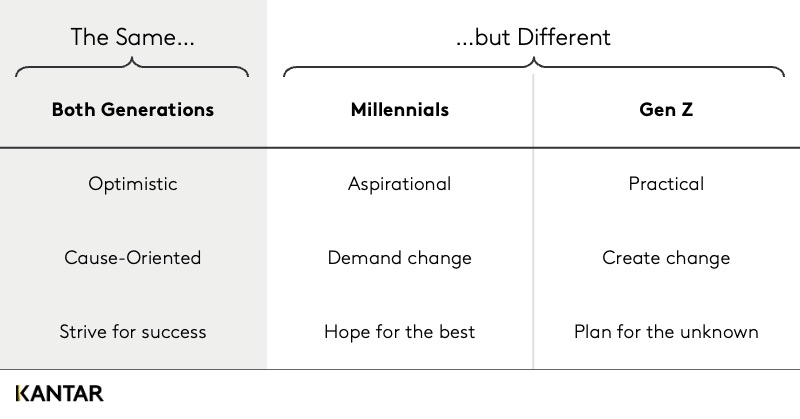With an eye toward cultivating not only the youth market but the future marketplace itself, companies are increasingly setting their sights on Gen Z and Millennials. Together these two generations make up a whopping 42% of the U.S. population (compared to a combined 27% for Baby Boomers and Matures) and their influence and buying power are both sizeable and growing. The question is, how well do you know these two generations?
For many companies, Gen Z and Millennials tend get lumped into a general ‘under 45’ cohort centered on shared attributes like a predilection for tech and social media. But, of course, savvy marketers know this limited viewpoint is not going to cut it, as successful campaigns hinge on connecting with consumers through a deep understanding of not only their lifestyle and demographics but their attitudes, values and motivations.
Starting Points Matter
Each generation views itself and the broader world through their own reality lens that is formed by key events that took place in their formative years. Called ‘starting points,’ such events primarily revolve around the economy, demographics and technology, as well as politics and culture. Starting points matter because they imbue a generation with their core values – a particular perspective from which a generation develops its sense of what’s possible, what’s valuable and what it will take to get what they want out of life.
Although Millennials started out in relatively easy times, growing up at the dawn of the internet and buoyed by self-perceptions of being special (think helicopter parents and participation trophies), their starting points comprise some of the most fraught events of the last 40 years, including the 9/11 terrorist attacks, the Great Recession and high unemployment. In contrast, Gen Z has come of age amidst relentless volatility (school shootings, Covid pandemic, inflation), rampant distrust of institutions, and weighty social, cultural and environmental issues such as Black Lives Matter, transgender rights and the climate crisis.
As a result of these different starting points, there are key differences in the core values of the two generations. Yes, both are digitally driven, cause-oriented and strive for success. Yet while Millennials prize authenticity and being true to yourself, Gen Z is focused on resilience in the face of unpredictability. While Millennials are aspirational and hope for the best in life, the more practical and realistic Gen Z plans for the unknown. While Millennials demand change from society, Gen Z looks to create change itself. And so on.

Making Authentic Connections
Understanding the core values of Millennials and Gen Z is only the beginning; you will need to translate this knowledge into action in order to achieve the ultimate goal of most marketing programs: establishing positive, long-lasting brand connections with consumers.
For Millennials, that means helping them achieve their full potential through a range of offerings that fit their lifestyle, satisfying their craving for novelty and exploration, and appealing to their community-minded, optimistic nature through authentic, aspirational and motivational messaging. Fostering a sense of community through shared interests (whether digitally or in real life) is additionally important to connecting with Millennials, many of whom maintain a strong reliance on their circle of friends, even as adults, and appreciate opportunities to bolster their support network. Further, many Millennials prioritize lived experiences over material possessions, creating the necessity for marketers to offer exceptional experiences that integrate elements of fun and joy into their products, services and communications.
While Millennials are often looking inward, members of Gen Z are prioritizing societal change to achieve their goals, as their sense of well-being is inextricably linked to the well-being of society and, indeed, the planet itself. Marketers can create connections with these young consumers by demonstrating authentic action and launching bold initiatives to address systemic issues, reduce barriers and create real change. (Win or lose, as long as your efforts are genuine, Gen Z will not fault you for trying.) Match their passion with hopeful but realistic messaging and help relieve the constant pressure they experience from work, school and society by delivering products and services that provide an outlet for joy and self-expression and that prioritize their mental health and emotional well-being. Ultimately, brands that show they are genuinely invested in cultivating Gen Z’s vision of a better future can win their loyalty for decades to come.
Of course, these recommendations are merely a brief introduction to engaging these two, very different and dynamic generations; it will take a great deal more time and work to understand the intricate and nuanced passions and priorities of Millennials and Gen Z. Just the same, the effort will be worth it, as companies who build relationships with each generation based on their respective attributes will be far better positioned for future growth than those taking a monolithic approach.

